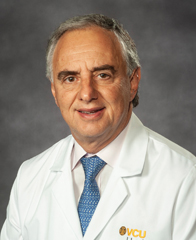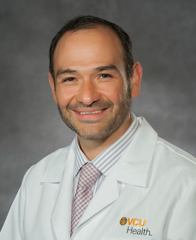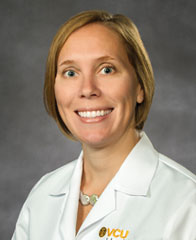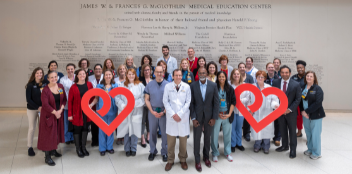Guzman Expands Interventional Team
 Luis Guzman, M.D.
Luis Guzman, M.D.
 Jose Exaire, M.D.
Jose Exaire, M.D.
 Barbara Lawson, M.D.
Barbara Lawson, M.D.
Since arriving in August 2015, Cardiac Catheterization Laboratory Medical Director Luis Guzman, M.D., has brought significant changes to interventional cardiology. The changes include new approaches, interventions and research to better meet the needs of an increasingly complex patient population.
“The cath lab has been transforming into a much more up to date and modern program,” he said. The addition of physicians with new expertise along with improved facilities make the innovations possible.
“We have transformed most of the interventions from femoral to radial access, moving from 30% radial before to nearly 90%,” he said. Approaches through the femoral artery in the groin “are known to increase bleeding complications and the need for vascular surgery to repair problems.” Radial access, through the artery in the wrist, has led to significantly shorter hospital stays for many patients with percutaneous interventions (PCIs). “Starting in December 2015, we are now doing same day discharges.”
“In one year, we completed over 100 CTOs with a very high success rate,” said Guzman.
Late in 2016 VCU introduced bioabsorbable stents, a new technology that allows the stent to disappear over time and restore the artery to its original condition.
Pauley’s interventional cardiologists are also treating an increasing number of patients with chronic total occlusions (CTOs), who make up more than 15% of the case load. Previously, the group made up less than 1% of patient cases. “In one year, we completed over 100 CTOs with a very high success rate,” he said.
While many hospitals offer CTOs, Pauley’s team uses antegrade approach, retrograde approach and re-entry approaches. “These are very advanced techniques in opening occluded arteries. There are very few doctors in the country especially dedicated to do these very complex procedures,” he said.
The structural heart disease program has grown significantly. “We more than doubled the number of procedures from 2015/2016 compared to 2014/2015,” he said. Trans-aortic valve replacements, which also involve the guidance and occasional intervention of cardiothoracic surgeons, are now performed without general anesthesia. Most patients can go home the following day as part of the new protocol. Previously, patients usually remained in the hospital for 3 to 5 days.
In 2016, the program began offering MitraClip interventions for leaky valves. “Instead of surgical repair this can now be done with a minimally invasive percutaneous procedure,” said Guzman. MitraClip provides an alternative to patients who were previously deemed too high risk for surgery.
The program introduced interventions in peripheral artery disease—that is, the narrowing of the arteries to the legs, stomach, kidney, arms and neck—completing over 100 to date.
VCU is the only hospital in the state involved in a clinical trial for patients with critical limb ischemia. “It involves angiogenesis therapy, which is the regeneration of new vessels to provide circulation to areas that do not have circulation in the lower extremities. This is only for patients with no-heal ulcers.” Interventional cardiology works closely with vascular surgeons in planning the care of these patients. “There is a very significant crossover between coronary artery disease and vascular disease, mainly in patients with diabetes.”
Interventional Cardiology is part of a new, multidisciplinary team that supports patients in cardiogenic shock due to heart failure. “They are very, very sick patients with a high mortality,” he said. Other team members include Cardiothoracic Surgery, Heart Failure, Coronary Intensive Care, and Perfusion. “We developed a standardized protocol and work as a team to decide the best treatment modalities for these patients.”
Patients with significantly impaired cardiac function are among those that require very complex, high risk indicated interventions (known as CHIP), another group that Pauley interventional cardiologists are reaching to provide an alternative to an increasing number of very ill and very challenging patients.
With all of these advances, Guzman is optimistic that VCU Health Pauley Heart Center has continued its course “of being one of the leading cath labs in the country.”
Welcome New Faculty!
Jose Exaire, M.D., has taken the position of associate professor at VCU. He arrives from Oklahoma City, where he served as the director of the Cardiac Care Unit of the V.A. Medical Center and an associate professor at the University of Oklahoma Health Sciences Center. He received his medical training from the National Autonomous University of Mexico, and completed his residency at the National Institute of Medical Sciences and Nutrition Salvador Zubiran in Mexico City. He completed fellowships in Cardiology and Interventional Cardiology. He is board certified in ABIM, Cardiovascular Disease and Interventional Cardiology.
“Jose brings significant expertise to the group in complex coronary interventions in the treatment of chronic total occlusions and procedures in peripheral arterial disease and critical limb ischemia—which is much needed in this community,” said Cardiac Catheterization Laboratory Medical Director Luis Guzman, M.D. Exaire will also help develop these programs at the Hunter Holmes McGuire V.A. Medical Center.
Barbara Lawson, M.D., joins as an assistant professor at VCU. She received her medical degree from University of Texas Medical Branch at Galveston and completed her residency at Johns Hopkins Hospital. From there, she completed a Cardiovascular Fellowship at the Cleveland Clinic, and Interventional Cardiology and Structural Heart Disease fellowships at Johns Hopkins Hospital. She is board certified in Internal Medicine, Echocardiography, Cardiovascular Disease and Interventional Cardiology.
“Structural heart disease is the fastest growing area in interventional cardiology, and she will bring to the group, including the McGuire V.A. Hospital, the development of a larger team. She was trained in one of the most prominent training places in the country for Structural Heart Disease and will bring her knowledge to increase the treatment of these types of patients,” said Guzman.
Back to Winter-2017
Join our Pauley Consortium composed of patients, friends and advocates.

